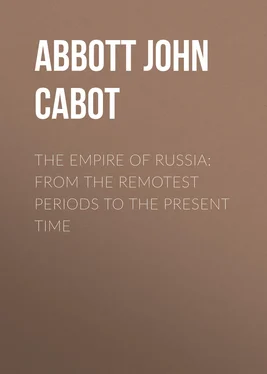At length Daniel, prince of Moscow, claimed independence of the nominal king, or grand prince, as he was called. In fact, most of the principalities were, at this time, entirely independent of the grand prince of Novgorod, whose supremacy was, in general, but an empty and powerless title. As Daniel was one of the nearest neighbors of André, and reigned over a desolate and impoverished realm, the grand prince was disposed to bring him into subjection. But neither of the princes dared to march their armies without first appealing to their Mogol masters. Daniel sent an embassador to the Mogol camp, but André went in person with his young and beautiful wife. The khan sent his embassador to Vladimir, there to summon before him the two princes and their friends and to adjudge their cause.
In the heat and bitterness of the debate, the two princes drew their swords and fell upon each other. Their followers joined in the melee, and a scene of tumult and blood ensued characteristic of those barbaric times. The Tartar guard rushed in and separated the combatants. The Tartar judge extorted rich presents from both of the appellants and settled the question by leaving it entirely unsettled , ordering them both to go home. They separated like two boys who have been found quarreling, and who have both been soundly whipped for their pugnacity. In the autumn of the year 1303 an assembly of the Russian princes was convened at Pereiaslavle, to which congress the imperious khan sent his commands.
"It is my will," said the Tartar chief, "that the principalities of Russia should henceforth enjoy tranquillity. I therefore command all the princes to put an end to their dissensions and each one to content himself with the possessions and the power he now has."
Russia thus ceased to be even nominally a monarchy, unless we regard the Khan of Tartary as its sovereign. It was a conglomeration of principalities, ruled by princes, with irresponsible power, but all paying tribute to a foreign despot, and obliged to obey his will whenever he saw fit to make that will known. Still there continued incessant tempests of civil war, violent but of brief duration, to which the khan paid no attention, he deeming it beneath his dignity to inter meddle with such petty conflicts.
André died on the 27th July, 1304, execrated by his contemporaries, and he has been consigned to infamy by posterity. As he approached the spirit land he was tortured with the dread of the scenes which he might encounter there. His crimes had condemned thousands to death and other thousands to live-long woe. He sought by priestcraft, and penances, and monastic vows, and garments of sackcloth, to efface the stains of a soul crimsoned with crime. He died, and his guilty spirit passed away to meet God in judgment.
CHAPTER VIII
RESURRECTION OF THE RUSSIAN MONARCHY
From 1304 to 1380
Defeat of Georges and the Tartars—Indignation of the Khan.—Michel Summoned to the Horde.—His Trial and Execution.—Assassination of Georges.—Execution of Dmitri.—Repulse and Death of the Embassador of the Khan.—Vengeance of the Khan.—Increasing Prosperity of Russia.—The Great Plague.—Supremacy of Simon.—Anarchy in the Horde.—Plague and Conflagration.—The Tartars Repulsed.—Reconquest of Bulgaria.—The Great Battle of Koulikof.—Utter Rout of the Tartars.
The Tartars, now fierce Mohammedans, began to oppress severely, particularly in Kief, the Christians. The metropolitan bishop of this ancient city, with the whole body of the clergy, pursued by persecution, fled to Vladimir; and others of the Christians of Kief were scattered over the kingdom.
The death of André was as fatal to Russia as had been his reign. Two rival princes, Michel of Tver, and Georges of Moscow, grasped at the shadow of a scepter which had fallen from his hands. In consequence, war and anarchy for a long time prevailed. At length, Michel, having appealed to the Tartars and gained their support, ascended the frail throne. But a fierce war now raged between Novgorod and Moscow. In the prosecution of this war, Georges obtained some advantage which led Michel to appeal to the khan. The prince of Moscow was immediately summoned to appear in the presence of the Tartar chieftain. By the most ignoble fawning and promises of plunder, Georges obtained the support of the khan, and returning with a Tartar horde, cruelly devastated the principality of his foe. Michel and all his subjects, roused to the highest pitch of indignation, marched to meet the enemy. The two armies encountered each other a few leagues from Moscow. The followers of Michel, fighting with the energies of despair, were unexpectedly successful, and Georges, with his Russian and Tartar troops, was thoroughly defeated.
Kavgadi, the leader of the Tartar allies of Georges, was taken prisoner. Michel, appalled by the thought of the vengeance he might anticipate from the great khan, whose power he had thus ventured to defy, treated his captive, Kavgadi, with the highest consideration, and immediately set him at liberty loaded with presents. Georges, accompanied by Kavgadi, repaired promptly to the court of the khan, Usbeck, who was then encamped, with a numerous army, upon the shores of the Caspian Sea. Soon an embassador of the khan arrived at Vladimir, and informed Michel that Usbeck was exasperated against him to the highest degree.
"Hasten," said he, "to the court of the great khan, or within a month you will see your provinces inundated by his troops. Think of your peril, when Kavgadi has informed Usbeck that you have dared to resist his authority."
Конец ознакомительного фрагмента.
Текст предоставлен ООО «ЛитРес».
Прочитайте эту книгу целиком, на ЛитРес.
Безопасно оплатить книгу можно банковской картой Visa, MasterCard, Maestro, со счета мобильного телефона, с платежного терминала, в салоне МТС или Связной, через PayPal, WebMoney, Яндекс.Деньги, QIWI Кошелек, бонусными картами или другим удобным Вам способом.
One of the Gods of the Russians.












